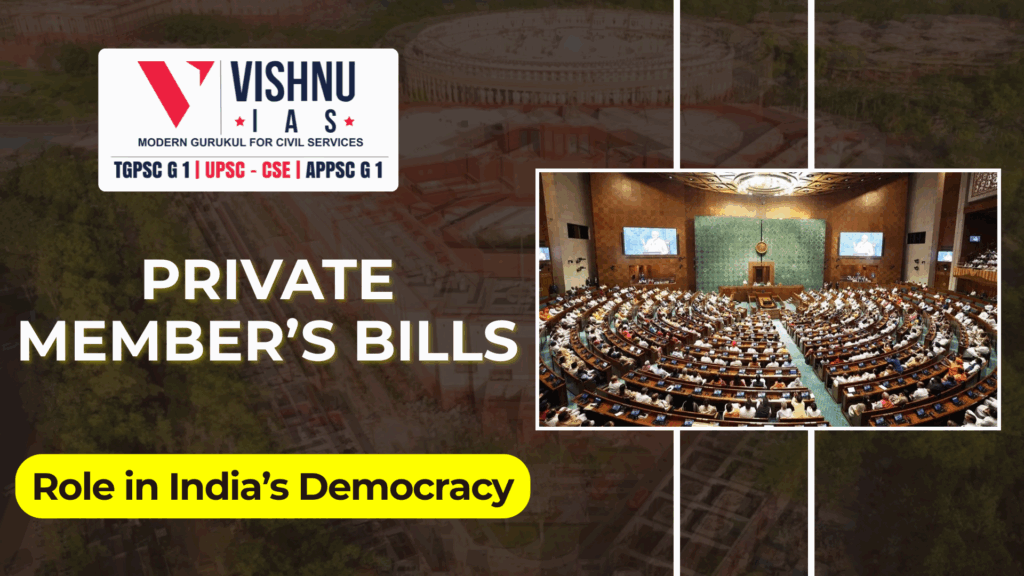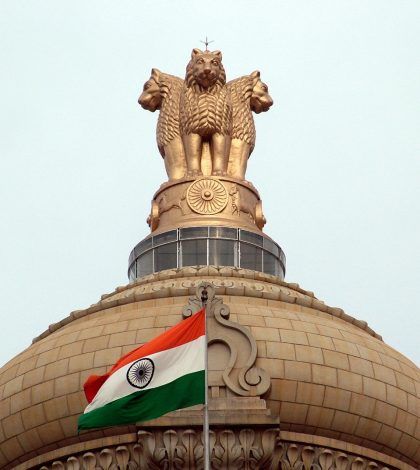Q. Examine the institutional challenges faced by Private Member’s Bills and suggest reforms to strengthen their role in India’s democracy.
Introduction:
- Private Member’s Bills (PMBs) are legislative proposals introduced by Members of Parliament (MPs) who are not ministers. They serve as a vital mechanism for MPs to propose legislation reflecting personal convictions, constituency interests, or emerging societal needs. Despite their potential to enrich democratic discourse, PMBs have faced significant institutional challenges in India.
- As of April 2025, during the 18th Lok Sabha, 64 PMBs were introduced in the Lok Sabha, yet none were discussed, highlighting a concerning trend in parliamentary practices.
Body
Institutional Challenges Facing Private Member’s Bills
1. Limited Time Allocation
- Marginalization in Parliamentary Schedule: PMBs are typically discussed on Fridays, but these sessions are often sacrificed for government business. E.g., in Budget Session 2025, only one Friday was used for a PMB resolution.
- Inadequate Discussion Time: During the 17th Lok Sabha (2019–2024), only 9.08 hours were spent discussing PMBs.
- Frequent Disruptions: Sessions reserved for PMBs are regularly disrupted, leading to adjournments without any debate.
2. Procedural and Structural Constraints
- Lack of Institutional Support: No standing committee exists to evaluate or prioritize PMBs.
- Dominance of Government Legislation: The legislative calendar is crowded with government bills.
- Absence of Deputy Speaker: Since 2019, the Lok Sabha has not elected a Deputy Speaker, impacting scheduling and balance in legislative business.
3. Political and Party Dynamics
- Party Whip Constraints: The Anti-Defection Law discourages MPs from supporting PMBs that diverge from party lines.
- Lack of Cross-Party Support: Many PMBs fail due to absence of bipartisan backing.
- Perception of Symbolism: PMBs are often dismissed as symbolic rather than substantive.
4. Historical Ineffectiveness
- Low Success Rate: Only 14 PMBs have been passed since Independence; none have cleared both Houses since 1970.
- Examples of Failure: The ‘Right to Disconnect’ Bill (2019) by Supriya Sule, despite its relevance, didn’t progress.
- Discouragement to Innovate: The dismal success record discourages MPs from investing in policy innovation.
Significance of Private Member’s Bills in a Democratic Framework
1. Platform for Diverse Voices
- Minority Representation: E.g., the 2014 ‘Rights of Transgender Persons Bill’ by Tiruchi Siva eventually influenced the 2019 Act.
- Localized Legislation: MPs can voice regional concerns.
- Policy Innovation: PMBs often introduce novel, future-ready policy ideas.
2. Enhancing Legislative Accountability
- Checks and Balances: PMBs can critique or complement government policies.
- Public Discourse: These bills stimulate public and parliamentary debates.
- Influence on Government: Even unpassed bills may shape official policies.
3. Encouraging Political Participation
- Empowerment of MPs: PMBs enable MPs to be proactive legislators.
- Democratic Representation: They connect MPs more closely with voter aspirations.
- Development of Expertise: Engaging with PMBs enhances legislative competence.
4. Complementing Government Legislation
- Filling Gaps: PMBs address neglected or niche areas.
- Testing Policy Ideas: They serve as pilot tests for potential government action.
- Responsive Governance: Quick responses to emerging needs can be attempted through PMBs.
Reforms to Strengthen the Role of Private Member’s Bills
1. Institutional Reforms
- Dedicated Fridays: Ensure PMBs are not overridden by government business.
- PMB Review Committee: Evaluate PMBs on relevance and public impact.
- Fast-Track Mechanism: Expedite bills with bipartisan/public support.
2. Procedural Innovations
- Ten-Minute Rule (UK Model): Short debates enable more bill introductions.
- Public Dashboards: Track bill status and engage citizens.
- Post-Adjournment Continuity: Allow unfinished PMBs to resume in the next session.
3. Political and Structural Changes
- Free Vote Clarification: Designate PMBs as “free vote” matters unless against party ideology.
- Deputy Speaker Election: Ensure impartial scheduling of legislative business.
- MP Support Systems: Provide research assistance via PRS or LARRDIS.
4. Public and Media Engagement
- Public Consultation Portals: Use platforms like MyGov for citizen feedback.
- PMB-Focused Media Coverage: Promote awareness and accountability through media briefings.
Conclusion
Private Member’s Bills, while often overlooked, play a critical democratic role. Though only 14 PMBs have been enacted since 1947, their influence—such as on transgender rights—has been considerable. Reviving PMBs isn’t just about procedural reform; it’s a democratic necessity that empowers individual legislators and enriches India’s parliamentary system.


